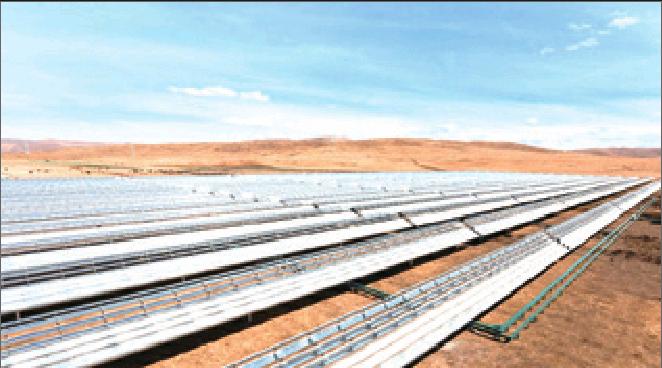Green Apple
2015-12-01ByMaraLeeDurrell
By+Mara+Lee+Durrell

Apple, the American company based in California but with a significant economic and production footprint in China, recently announced it is now generating clean energy for 100 percent of its in-country operations. It is one of the first companies operating in China with such a big impact to make this commitment.
Apple defined its “greening” strategy on October 22, telling Beijing Review that new clean-energy programs in China will “promote low-carbon manufacturing and green growth.”
“Climate change is one of the great challenges of our time, and the time for action is now,” said Tim Cook, Apples CEO, who was in Beijing for the announcement. “The transition to a new green economy requires innovation, ambition and purpose. We believe passionately in leaving the world better than we found it and hope that many other suppliers, partners and other companies join us in this important effort.”
Lisa P. Jackson, Vice President of Environment, Policy and Social Initiatives at Apple, who formerly served as administrator of the U.S. Environmental Protection Agency and oversaw environmental regulations made in the United States, was also in town for the announcement, an Apple spokesperson told Beijing Review.
“Being responsible, protecting air and water, and driving clean energy are at the heart of Apples commitment to China,”asserted Jackson, according to a company press release. “These projects go beyond Apples operations in China to help our suppliers adopt clean renewable energy.”
Going green
Apple pointed to programs that are at the core of its efforts to effectively eliminate its carbon footprint in China which, according to the company, will avoid over 20 million metric tons of greenhouse gas pollution between now and 2020. That level of emissions reduction is equivalent to taking nearly 4 million passenger vehicles off the road for one year, according to the release.
The tech giant also announced that construction on 40 megawatts of solar projects in southwest Chinas Sichuan Province is now complete. The project is the first of its kind that the company has launched outside the United States. It is producing more than the total amount of electricity used by Apples offices and retail stores in China, which the company claimed makes their Chinese operations carbon neutral.
Apple has also launched a new initiative to drive its contractors to become more energy efficient and to use clean energy for their manufacturing operations. It is partnering with suppliers in China to install more than 2 gigawatts of new clean energy in the coming years.
Partners in this effort already include Foxconn Technology Group, a giant contract manufacturer operating in China, which will construct 400 megawatts of solar by 2018 starting in central Chinas Henan Province. Foxconn, one of the largest employers in China, has committed to generating as much clean energy as its factory in Zhengzhou, capital of Henan, consumes in its final production of the iPhone.
“We are excited to embark on this initiative with Apple. Our companies share a vision for driving sustainability and I hope this renewable energy project will serve as a catalyst for continued efforts to promote a greener ecosystem in our industry and beyond,” said Terry Gou, founder and CEO of Foxconn. “Sustainability is a core pillar in Foxconns strategy and we are committed to investing in green manufacturing.”
Apples footprint
Internationally, the technology company has made a pledge to help protect the environment by completely transitioning from fossil fuels to clean energy. It has said that its facilities in the United States—in addition to its operations in China—are being powered with 100-percent green energy. Globally, renewable energy powers more than 87 percent of its operations, with a stated goal to reach 100 percent worldwide and “achieve a net-zero impact on the worlds supply of sustainable virgin fiber.”
In May, Apple signed an agreement with the World Wildlife Fund (WWF) for a multi-year project to significantly increase responsibly managed forests across China and reduce the companys carbon footprint. The forestland program aims to protect as many as 1 million acres of responsibly managed working forests that provide fiber for pulp, paper and wood products.
“Apples support for this project and its environmental leadership show that protecting forests is not just good for society but important for business,” said Lo Sze Ping, CEO for WWF China. “This collaboration between our two organizations will seek to reduce Chinas ecological footprint by helping produce more wood from responsibly managed forests within its own borders. Doing so is essential to China, the worlds biggest timber importer. Our hope is this will catalyze a new model of corporate leadership in promoting sustainable forest management and using paper resources more efficiently and responsibly around the world.”
A focus on China
China continues to be one of the largest consumer markets for Apple, a company spokesperson told Beijing Review, and the conglomerate is one of the largest foreign companies operating in China if measured by sales revenue.
On October 27, Apple announced financial results for its fiscal 2015 fourth quarter ending September 26, 2015. The company posted quarterly revenue of $51.5 billion and quarterly net profit of $11.1 billion. International sales accounted for 62 percent of the quarters revenue. Apple sales in the Greater China area reached $12.52 billion, about a quarter of its total revenue.
Apple currently has 19 corporate offices and 25 retail stores in the Greater China area, directly employing about 10,000 people. The company employs over 100,000 people across its worldwide operations.
In total, Apple has helped create and support over 4.4 million jobs in China, including at least 1.4 million iOS app developer jobs and other positions related to the iOS ecosystem. The company boasts that developers in China have earned more than $4 billion through the worldwide sale of apps on the App Store, with over half of that amount paid in the last year alone.
Apples senior executives are often seen in China. Cooks recent visit and the October 22 environmental announcement coincided with Chinas first National Mass Entrepreneurship and Innovation Week, which kicked off on October 19 in eight cities including Beijing, Shanghai and Shenzhen in Guangdong Province. The weeklong event aims to bring together technology gurus who work across different platforms to meet face to face, exchange ideas, and share new developments.
On October 21, Cook took the opportunity to meet with and encourage a small team that is developing an application for traditional Chinese wood joints, which are used for furniture and architecture. Downloads of the app have already hit nearly 1 million, with customers ranging from students to art and design practitioners.
At similar events marking the occasion, Cook noted that many people in China are using new technology to start their own businesses, while many others are hiring and beginning to deliver their products to millions of people. “They are the engine of the economy,” he said.
Trendsetting
In regards to environmental impact, China is an obvious place for multinational companies to focus their attention, as the country continues to hold its place as the worlds largest emitter of greenhouse gases. In July, the Chinese Government formally committed to having its emissions peak by 2030, a pledge announced in preparation for the new international climate agreement to be finalized in December in Paris.
According to the National Resources Defense Council, an environmental group headquartered in New York City, “Chinas climate commitment, and action underway to cap coal consumption and continue to expand clean energy, puts it on a path to cut more dangerous carbon pollution and earlier than many previously expected. This will bring enormous health, environmental and economic benefits to Chinese people, and help the world stem the worst impacts of climate change.”
Companies like Apple, which have an enormous manufacturing footprint in China, could help make these carbon reduction goals a reality if enough of them commit to making their operations and their entire supply chains greener. Ostensibly, they could even assist in ensuring that China peaks its emissions ahead of schedule.
The Climate Group, an international nonprofit organization with offices in China, launched its RE100 campaign in 2014 with hopes of convincing more businesses of the benefits of going green. The group claims that switching to 100-percent renewable energy “is a smart business decision. It can help manage fluctuating energy costs, provide energy security, improve reputation and deliver carbon emission reduction goals.”
The private sector accounts for more than half of the worlds electricity consumption, according to The Climate Group. Companies joining RE100 are encouraged to set a public goal to procure 100 percent of their electricity from renewable sources of energy by a specified year.
Since RE100 was launched, more than 38 large companies have joined, including a wide range of industrial sectors, such as telecommunications, IT, retail and food production. In March, Elion Resources Group in north Chinas Inner Mongolia Autonomous Region became the first Chinese company to join RE100 and publicly commit to becoming 100 percent powered by renewable energy. RE100 is partnering with the Chinese Renewables Energy Association in China to help more Chinese companies easily and cost-effectively source renewable electricity.
